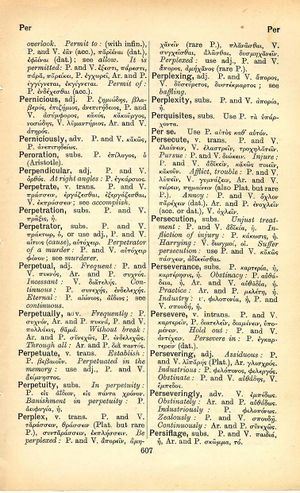persecute: Difference between revisions
From LSJ
Λυπεῖ με δοῦλος δεσπότου μεῖζον φρονῶν → Servus molestu'st supra herum sese efferens → Ein Ärgernis: ein Sklave stolzer als sein Herr
(Woodhouse 4) |
(CSV4) |
||
| Line 1: | Line 1: | ||
{{ | {{Woodhouse1 | ||
| | |Text=[[File:woodhouse_607.jpg|thumb|link={{filepath:woodhouse_607.jpg}}]]'''v. trans.''' | ||
P. and V. ἐλαύνειν, V. ἐλαστρεῖν, τροχηλατεῖν. | |||
<b class="b2">Pursue</b>: P. and V. διώκειν. | |||
<b class="b2">Injure</b>: P. and V. ἀδικεῖν, κακῶς ποιεῖν, κακοῦν. | |||
<b class="b2">Afflict, trouble</b>: P. and V. λυπεῖν, V. γυμνάζειν, Ar. and V. τείρειν, πημαίνειν (also Plat. but rare P.). | |||
<b class="b2">Annoy</b>: P. and V. ὄχλον [[παρέχω|παρέχειν]] (dat.). Ar. and P. ἐνοχλεῖν (acc. or dat.), V. ὀχλεῖν. | |||
}} | }} | ||
Revision as of 09:48, 21 July 2017
English > Greek (Woodhouse)
v. trans.
P. and V. ἐλαύνειν, V. ἐλαστρεῖν, τροχηλατεῖν. Pursue: P. and V. διώκειν. Injure: P. and V. ἀδικεῖν, κακῶς ποιεῖν, κακοῦν. Afflict, trouble: P. and V. λυπεῖν, V. γυμνάζειν, Ar. and V. τείρειν, πημαίνειν (also Plat. but rare P.). Annoy: P. and V. ὄχλον παρέχειν (dat.). Ar. and P. ἐνοχλεῖν (acc. or dat.), V. ὀχλεῖν.

